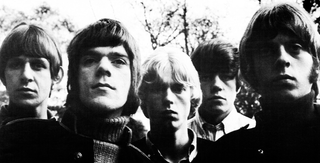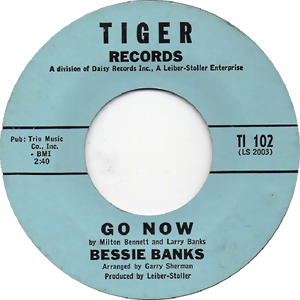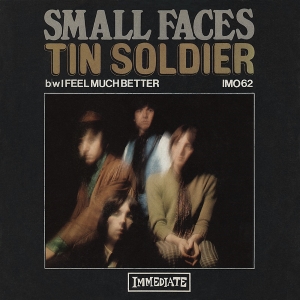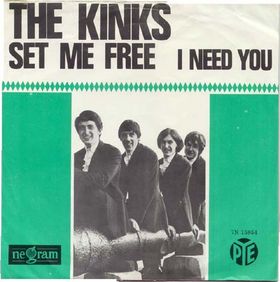
The Move were a British rock band of the late 1960s and the early 1970s. They scored nine top 20 UK singles in five years, but were among the most popular British bands not to find any real success in the United States. For most of their career the Move were led by guitarist, singer and songwriter Roy Wood. He wrote all the group's UK singles and, from 1968, also sang lead vocals on many songs. Initially, the band had four main vocalists who divided amongst themselves the lead vocal duties.

"Let's Spend the Night Together" is a song written by Mick Jagger and Keith Richards, and originally released by the Rolling Stones as a double A-sided single together with "Ruby Tuesday" in January 1967. It also appears as the opening track on the American version of their album Between the Buttons. The song has been covered by various artists, including David Bowie in 1973.
"Hawaii" is a song written by Brian Wilson and Mike Love for the American rock band the Beach Boys. It was recorded in July 1963 and released on their 1963 album Surfer Girl. It is one of the first Beach Boy songs that Hal Blaine played on, contributing timbales, but regular drummer Dennis Wilson still played. In January 1964, it was released as a single in Australia, becoming a top-10 hit. "Hawaii" made its way into the Beach Boys repertoire almost 50 years later.

"All Day and All of the Night" is a song by the English rock band the Kinks from 1964. Released as a single, it reached No. 2 in the UK on the Record Retailer chart and No. 7 on the US Billboard Hot 100 chart in 1965. The song was included on the Kinksize Hits EP in the UK and the Kinks' second American album, Kinks-Size (1965).

Move is the debut album by British rock group the Move, released in March 1968 through Regal Zonophone Records. The album features ten Roy Wood compositions, along with three covers which had been a prominent part of the group's live act. Although scheduled for an earlier release, the album was delayed by the theft of the master tapes, which led to the tracks needing to be re-recorded. The album was sporadically recorded between January 1967 and February 1968 at Advision, De Lane Lea and Olympic Studios in London, during gaps in their tight recording schedule when the group were not booked for any performances.

"She's a Rainbow" is a song by the Rolling Stones and was featured on their 1967 album Their Satanic Majesties Request. It has been called "the prettiest and most uncharacteristic song" that Mick Jagger and Keith Richards wrote for the Stones, although somewhat ambiguous in intention.

"Have You Seen Your Mother, Baby, Standing in the Shadow?" is a song by the English rock band the Rolling Stones. Written by Mick Jagger and Keith Richards, it was recorded in the late summer of 1966 during early sessions for what would become their Between the Buttons album. It was the first Stones single to be released simultaneously in both the UK and the US, and reached number five and number nine on those countries' charts, respectively.

"The Last Time" is a song by the English rock band the Rolling Stones featuring the Andrew Oldham Orchestra, and the band's first original song released as an A-single in the UK. Written by Mick Jagger and Keith Richards, and recorded at RCA Studios in Hollywood, California in January 1965, "The Last Time" was the band's third UK single to reach number one on the UK Singles Chart, spending three weeks at the top in March and early April 1965. It reached number two in the Irish Singles Chart in March 1965, and was released on the US version of the album Out of Our Heads on 30 July 1965.

"Blackberry Way" is a 1968 single by British band The Move. Written by the band's guitarist/vocalist Roy Wood and produced by Jimmy Miller, "Blackberry Way" was a bleak counterpoint to the sunny psychedelia of earlier recordings. It nevertheless became the band's most successful single, reaching number 1 on the UK Singles Chart in February 1969.

"Sealed with a Kiss" is a song written and composed by Peter Udell and Gary Geld. The original recording of "Sealed with a Kiss" was by the Four Voices which was released as a single in May 1960 without becoming a hit. It first became a hit in 1962 for Brian Hyland. Jason Donovan later had an international number one hit with the song in 1989.

"Go Now" is a song composed by Larry Banks and Milton Bennett and first recorded by Bessie Banks, released as a single in January 1964. The best-known version was recorded by the Moody Blues and released the same year.
"It's All Over Now" is a song written by Bobby Womack and his sister-in-law Shirley Womack. It was first released by The Valentinos, featuring Bobby Womack, in 1964. The Rolling Stones heard it on its release and quickly recorded a cover version, which became their first number-one hit in the United Kingdom, in July 1964.

"Tin Soldier" is a song released by the English rock band Small Faces on 2 December 1967, written by Steve Marriott. The song peaked at number nine in the UK singles chart and number 38 in Canada. It has since been covered by many other notable rock artists.

"Set Me Free" is a song by Ray Davies, released first by the Kinks in 1965. Along with "Tired of Waiting for You", it is one of band's first attempts at a softer, more introspective sound. The song's B-side, "I Need You", makes prominent use of powerchords in the style of the Kinks' early, "raunchy" sound. "Set Me Free" was heard in the Ken Loach-directed Up the Junction, a BBC Wednesday Play which aired in November 1965; this marked the first appearance of a Kinks song on a film or TV soundtrack.

"Dead End Street" is a song by the British band the Kinks from 1966, written by main songwriter Ray Davies. Like many other songs written by Davies, it is to some degree influenced by British Music Hall. The bass playing was partly inspired by the "twangy" sound of Duane Eddy's guitar. It was originally released as a non-album single, but has since been included as one of several bonus tracks from the Face to Face CD. The song, like many others by the group, deals with the poverty and misery found in the lower classes of English society.
"Silence Is Golden" is a song initially recorded by the American rock band the Four Seasons. Written by Bob Crewe and Bob Gaudio, Philips Records released it in 1964 as the B-side of the U.S. number 1 single "Rag Doll", which was also written by Crewe and Gaudio. The Tremeloes' 1967 cover version reached number 1 on the UK Singles Chart and number 11 on the US charts.

"(You're the) Devil in Disguise" is a 1963 single by Elvis Presley. It was written by Bill Giant, Bernie Baum, and Florence Kaye and was published by Elvis Presley Music in June 1963. The song peaked at No. 3 in the US on the Billboard singles chart on August 10, 1963, and No. 9 on the Billboard Rhythm and Blues chart, becoming his final top ten single on either chart. The single was certified gold by the RIAA for sales in excess of 500,000 units in the US. The song also topped Japan's Utamatic record chart in the fall of 1963.

"Let's Dance" is a 1962 hit single by Chris Montez, written and produced by Jim Lee.
"Cherry Blossom Clinic" is a song by British rock band The Move, written by their lead guitarist, vocalist, and primary songwriter Roy Wood, intended as the follow-up single to their hit "Flowers in the Rain", which reached number two in the Record Retailer chart. Like many of Wood's other songs, "Cherry Blossom Clinic" deals with clinical insanity and loneliness, and makes several pop culture references throughout, which he largely credits to an ambition for writing a children's book. The track was initially recorded in August 1967 at Advision Studios, but was abandoned for three months before being re-recorded in November of that year, and lacks a production credit.
"Crazy 'Bout My Baby" is a song first written and recorded by musician Robert Mosley in 1963. His third solo single, it failed to chart, leading to it becoming his final single released. Initially an obscure single, it was brought to light by mainstream acts such as The Swinging Blue Jeans and Tages, the latter of which charted in Sweden with it.















